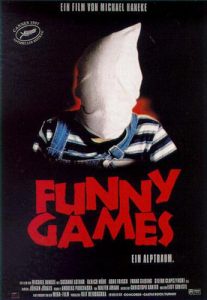Making a Bet on Life
Funny Games and Human Dignity
by Pınar Çetinkaya

Funny Games (1997), directed by Michael Haneke, is a provocative film about two good-looking guys, Paul and Peter, torturing an upper middle-class family, the Schobers (Anna, George, and Georgie), by breaking into their lake house. The unreasonable and disturbing violence in the movie leads the audiences to question the nature of violence rather than showing brutal violence because Michael Haneke aims to subvert the perspective of the audiences about the violence that can always be explained by reasons in the films. The film pushes the boundaries of both audiences and the characters through excessive violence and reveals that violence cannot be an entertainment tool, but is a disturbing attack that violates human dignity both physically and psychologically.
Although we, spectators, want to be given some reason for the violence in the film, Haneke does not prefer to lay the ground for the violence. Instead, he tries to come up with an ethical dilemma by including the audience in the scenes in which Paul talks to the audience through the cameras. We are included in this game as both victims and torturers because, while sharing the fears and desperation of the family , we also take the side of the torturers by continuing watching with the desire to find a reason for this violence.
There are two types of violence in the movie: physical violence, such as hitting, shooting, stabbing, and tying, and psychological violence including humiliation, terrorizing, forcing the victims to strip, and witness torture. The father’s leg is injured by a golf club; the mother is stripped naked in front of her child and the strangers; the child is killed before his parents; the mother and father are tied up; the father is killed before his wife; at the end, the woman is thrown into the sea. Throughout the events, both the father and mother gradually lose their senses and hope for life because their lives are attacked, their dignity is humiliated and they become heavily traumatized individuals. Therefore, when morning comes, the only thing that the woman is looking forward to is dying after all the bloody experiences.
By keeping the torture at the highest level, Haneke, who lets neither the characters nor the audience breath, forces the audience, whom he deliberately disturbs, to take a more active stance against violence instead of seeing violence as a cinematic element in the films. The film shows how torture affects individuals deeply and makes them unable to hold on to life. It reveals that the traumatized condition of individuals who are the backbone of society will also shake up society as it affects the audience watching the movie. Therefore, it makes us think that violence is something terrifying even in films and it targets human dignity which is one of the fundamental values that should be preserved in society, since securing the existence of individuals and torturing individuals does not only cause physical damage but also psychological harm, which has a negative impact on the development of healthy societies.

